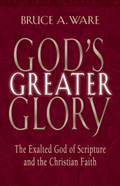
Bruce A. Ware
Reviewed by: Iain Wright
God's Greater Glory: The Exalted God of Scripture and the Christian Faith, by Bruce A. Ware. Published by Crossway, 2004. Paperback, 254 pages, list price $17.99. Reviewed by Pastor lain Wright.
Dr. Ware teaches at Southern Baptist Theological Seminary. He writes as an academic theologian, but also has a pastor's heart. The first part of his book defends the sovereignty of God, while the shorter second part addresses practical considerations.
Ware believes in God's "exhaustive and meticulous sovereignty. "The problem is how to maintain man's responsibility if God is completely sovereign. Ware attempts to solve that problem by drawing upon the theory of "middle knowledge" (propounded by the sixteenth-century Jesuit philosopher Luis de Molina). He argues that God knows not only what is actual and what is possible, but also what is contingent (what free creatures will decide to do in various circumstances). By ordering our circumstances, God governs our affairs, while leaving us free to make our own choices and therefore responsible for our actions.
This may seem to be an attractive solution, but it is not without its difficulties. Unfortunately, Ware does not deal with the criticisms of this view, such as those given by the Reformed theologians Turretin and a Brackel.
Also, the Westminster standards do j not support the theory of middle knowledge. The Confession states: "Although God knows whatsoever may or can come to pass upon all supposed conditions, yet hath he not decreed anything because he foresaw it as future, or as that which would come to pass upon such conditions" (3.2).
Ultimately, the success of this theory in allowing for man's ability to make his own choices is its greatest weakness. The theory would seem to suggest that man is somewhat like a stick floating on a river. God controls the river and thus where the ~ stick goes, but does not directly control the stick. Ware wants to preserve the independence of the stick. However, we must also uphold God's sovereignty over the stick - that is, his direct control over the hearts and minds of men.
There are further unexplored ramifications. For instance, what does this thesis do to our doctrine of effectual calling? Does the sinner's response to the gospel ultimately come from himself (even though God has led him every step of the way), or is it "of God's free and special grace alone, not from anything at all foreseen in man, who is altogether passive therein, until, being quickened and renewed by the Holy Spirit, he is thereby enabled to answer this call" (Confession, 10.2)? Perhaps Ware has an answer, but thus far an appeal to middle knowledge does not seem to solve the problem of man's responsibility in the light of God's sovereignty.
All this is not to say that there are not many fine features in the book. The second part applies the doctrine of God's sovereignty to suffering, prayer, and service. It is not necessary to hold to any doctrine of middle knowledge in order to benefit from Ware's pastoral handling of the implications that God is sovereign.
January 25, 2026
January 18, 2026
January 11, 2026
Texts that Transform: Church and Ministry
January 04, 2026
December 28, 2025
December 21, 2025
December 14, 2025
© 2026 The Orthodox Presbyterian Church